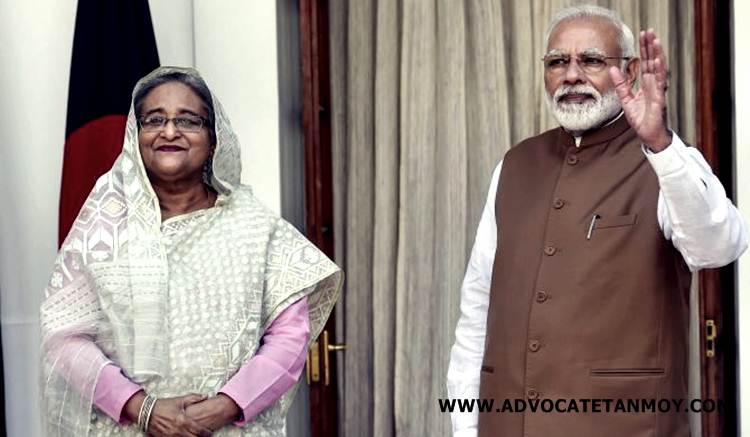


The recent announcement by Muhammad Yunus that Bangladesh's interim government will seek the extradition of former premier Sheikh Hasina from India has put the Indian government in a difficult position. With strained relations between the two countries and concerns over safety and stability, India must carefully weigh the pros and cons of complying with the request. This situation also raises questions about India's legal obligations and the potential impact on their relationship with Bangladesh's ruling parties.
Bangladesh's Extradition Request for Sheikh Hasina: India Faces Dilemma
Background
Muhammad Yunus, founder of the Grameen Bank and advisor to the interim government of Bangladesh, recently announced the government's intention to seek the extradition of former Prime Minister Sheikh Hasina from India. Hasina is currently in exile in India after being charged with corruption and other offenses by the interim government.
The announcement has strained relations between Bangladesh and India, which are already tense over territorial disputes and other issues. India has expressed concern over Hasina's safety and stability in Bangladesh, and faces a difficult decision regarding whether to comply with the extradition request.
India's Dilemma
India must carefully consider several factors:
Potential Consequences
If India agrees to extradite Hasina, it could damage relations with Bangladesh and lead to instability in the region. India could also be accused of violating its legal obligations and undermining its own democratic values.
If India refuses to extradite Hasina, it could further strain relations with Bangladesh and raise questions about its commitment to combating corruption. India could also face international criticism for interfering in another country's internal affairs.
Top 5 FAQs
1. What are the charges against Sheikh Hasina?
Hasina has been charged with corruption, extortion, and abuse of power during her time as Prime Minister of Bangladesh.
2. Why is India reluctant to extradite Hasina?
India is concerned about her safety and stability in Bangladesh, as well as the potential for violence and unrest in the region.
3. What is the legal basis for India to extradite Hasina?
India is bound by treaties to extradite criminals, but Hasina has not been convicted of any crimes in India. India may argue that the charges against her are politically motivated.
4. What are the potential consequences of India's decision?
If India agrees to extradite Hasina, it could damage relations with Bangladesh and lead to instability in the region. If India refuses, it could further strain relations with Bangladesh and raise questions about its commitment to combating corruption.
5. What is the likelihood of India extraditing Hasina?
The outcome is uncertain and will depend on a number of factors, including the strength of the evidence against Hasina, the political situation in Bangladesh, and India's own national interests.

In a strongly worded statement, politician Shashi Tharoor expressed his opposition to the VB-G RAM G Bill that aims to replace MNREGA. Tharoor argued that the removal of Mahatma Gandhi's name from the scheme goes against its core values and also criticized other proposed changes such as financial alterations and a shift of responsibility to states. The politician believes that the Bill poses a threat to the principles of federalism and that the scheme should not be made subject to executive notification.

Union Minister Shivraj Singh Chouhan introduced the Viksit Bharat - Guarantee for Rozgar and Ajeevika Mission (Gramin): VB-G RAM G Bill, 2025 in the Lok Sabha. The bill aims to establish a new rural development framework aligned with the national vision of Viksit Bharat @2047 and seeks to provide a statutory guarantee of 125 days of wage employment to each rural household. The government is determined to pass the bill in this parliamentary session and failure to do so could complicate budgetary provisions.

In a significant move to improve academic standards, India's new Viksit Bharat Adhishthan Bill, 2025, places student feedback at the heart of higher education accreditation. Union Education Minister Dharmendra Pradhan, citing the National Education Policy 2020, announced that for the first time, students will have a direct impact on accreditation outcomes. The new framework will also increase institutional autonomy and encourage innovation, but with a strong emphasis on accountability through transparent student-led evaluations. The consolidation of regulators and accreditation bodies aims to streamline and strengthen the quality of higher education in India.

On the occasion of Vijay Diwas, a day commemorating India's 1971 victory over Pakistan, Rahul Gandhi, Leader of Opposition in Lok Sabha, paid his respects to the brave soldiers who showed indomitable courage, leading to the liberation of East Pakistan and the formation of Bangladesh. The date also marks the surrender of 93,000 Pakistani soldiers to the Indian Armed Forces and is a tribute to the bravery and sacrifice of Indian soldiers. Congress National President Mallikarjun Kharge also highlighted the 1971 victory as a great example of humanity and justice under the leadership of then Prime Minister Indira Gandhi.

Senior Congress leaders respond to Delhi court's refusal to take ED's chargesheet in the National Herald-Young Indian case, emphasizing the lack of evidence and foundation of the case. They accuse the BJP of exaggeration and targeting the opposition, claiming that the ruling has validated their long-held belief that the case is politically motivated. Congress leader Abhishek Manu Singhvi highlights the legality and commonality of corporate restructuring, while Congress general secretary K.C. Venugopal condemns the Modi government's targeting of Sonia Gandhi and Rahul Gandhi without any legal basis.

The Congress party declared a moral and legal triumph after the Delhi court dismissed the Enforcement Directorate's chargesheet in the National Herald-Young Indian case. The judge noted that the chargesheet was based on a private complaint rather than an FIR, making it legally inadmissible. The Congress accused the Modi government of maliciously targeting its leaders and misusing central agencies for political gain. They vowed to continue fighting for truth and democratic rights, asserting that nothing could deter them from their mission.

India commemorates Vijay Diwas every year on December 16 to honour the soldiers who sacrificed their lives during the 1971 war with Pakistan, which resulted in the creation of Bangladesh. As part of this year's celebrations, the Indian Army displayed a reconstructed Turkish armed drone, Yiiha, which was shot down by India during Operation Sindoor on May 10. The Kamikaze class of drones, also known as "suicide drones," were used by Pakistan to target Indian military and civilian installations, but were almost all destroyed by the Indian military.

India celebrates the 54th Vijay Diwas, honoring the bravery and sacrifice of its soldiers in the 1971 war that led to the liberation of Bangladesh. Political leaders, including Prime Minister Narendra Modi and President Droupadi Murmu, pay glowing tributes to the armed forces and their unmatched courage. The Army marks the occasion by recalling the historic triumph and the flawless coordination between different branches of the military, with an impressive Military Tattoo in Kolkata.

Renowned spiritual leader and former BJP MP, Ram Vilas Vedanti, passed away at the age of 67 due to a heart attack. Known for his significant role in the Ram Janmabhoomi movement, Vedanti had been admitted to a hospital in Rewa for a blood infection and low blood pressure. Attempts to transport him to a better medical facility were unsuccessful due to bad weather. Political leaders, including Uttar Pradesh Chief Minister Yogi Adityanath, expressed their condolences and praised Vedanti's contributions to society.

Indian Ambassador to the United Nations, Harish P, slammed Pakistan for misusing international platforms for its hostile agenda against India at the UNSC Open Debate on “Leadership for Peace”. He objected to Pakistan’s reference to Jammu and Kashmir and questioned its democratic credentials while reaffirming India’s stance on cross-border terrorism. This reflects the ongoing strain in India-Pakistan relations and New Delhi’s determination to counter any attempt by Islamabad to internationalise bilateral disputes.